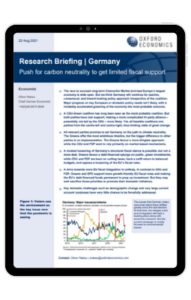Germany | Push for carbon neutrality to get limited fiscal support

The race to succeed long-term Chancellor Merkel and lead Europe’s largest economy is wide open. But we think Germany will continue its reactive, consensual, and inward-looking policy approach irrespective of the coalition. Major progress on key European or domestic policy needs isn’t likely, with a modestly accelerated greening of the economy the most probable outcome.
What you will learn:
- All relevant parties promise to set Germany on the path to climate neutrality. The Greens offer the most ambitious timeline, but the bigger difference to other parties is on implementation. The Greens favour a more dirigiste approach, while the CDU and FDP want to rely primarily on market-based mechanisms.
- A modest loosening of Germany’s structural fiscal stance is possible, but not a done deal. Greens favour a debt-financed splurge on public, green investments, while CDU and FDP are keen on cutting taxes, back a swift return to balanced budgets, and oppose a loosening of the EU’s fiscal rules.
- A drive towards more EU fiscal integration is unlikely. In contrast to CDU and FDP, Greens and SPD support more growth-friendly EU fiscal rules and making the EU’s debt-financed funds permanent to prop up investment. But they may well sacrifice those priorities to promote their domestic initiatives.
Tags:
Related Services

Post
Eurozone: Little sign of harm from the Red Sea disruptions
The impact of Red Sea shipping disruption on the eurozone economy continues to be limited, in line with our baseline view. Our new Eurozone Supply Stress Indicator suggests that supply pressures have returned to normal following a period of easing in 2023.
Find Out More
Post
GCC: Key themes shaping city economies in the near term
For Gulf cities, the near-term outlook will be tied not only to the global macroeconomic backdrop, but also the progress of the diverse visions and strategies in the region. With the aim to diversify their economies and reduce the dependence on oil, Gulf states continue to invest in the non-oil economy and implement various reforms. That said, oil revenues remain key to funding diversification efforts.
Find Out More